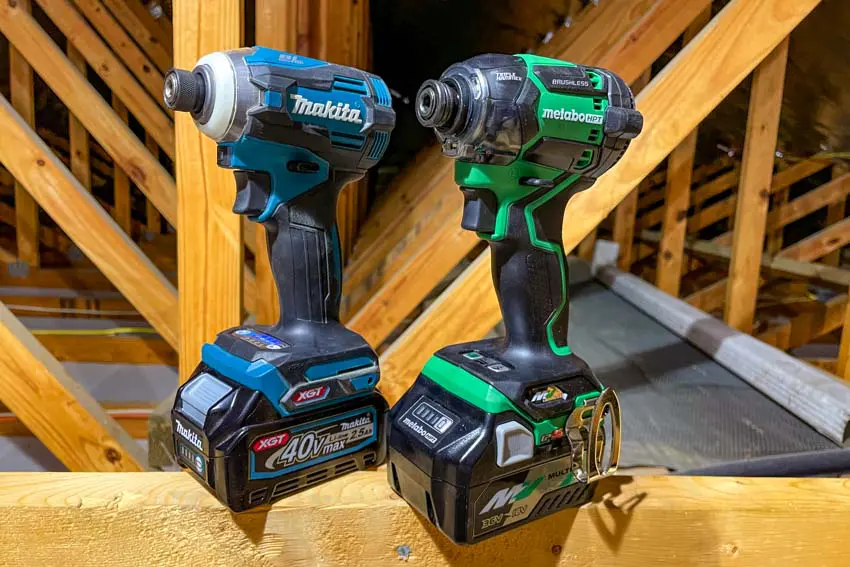This time around, we’re looking at two well-loved professional brands with Japanese heritages. In this Makita vs Metabo HPT impact driver head-to-head review, both brands boast their respective higher-voltage systems. For Makita, it’s the 40V max XGT GDT01 that served as its first-generation model for the line, though it’s built on years of R&D gained from the 18V XGT platform. For Metabo HPT (formerly Hitachi—same tools, different name), it’s the 36V Triple Hammer BOLT (WH36DC) model that boasts a three-hammer mechanism along with a host of other features.
We’re laying out what we discovered in our testing, but the final call is up to you. We want to hear who you think makes the better impact driver based on the way you work, so drop a comment below!
Check out our best impact driver recommendations for the year!
Why Not Use the Makita GDT02?
Makita has a second impact driver (GDT02) for the XGT line that’s more recent and we took a close look at it. After careful consideration, the GDT01 is the better of the two, so we’re using it for this flagship impact driver comparison.
Makita Vs Metabo HPT Impact Driver Specifications
Here are the basic numbers to know before we jump into the testing:
| Makita GDT01 | Metabo HPT WH36DC | |
| Top Speeds | 1100/2100/3200 3700 RPM | 900/2900/3400/3700 |
| Max Impact Rate | 4400 IPM | 4100 IPM |
| Max Torque | 1950 in-lbs | 1903 in-lbs |
| Head Length | 4.8 in | 4.5 in |
| Bare Weight | 2.2 lbs | 2.0 lbs |
| Weight w/Tested Battery | 3.7 lbs | 3.5 lbs |
Makita Vs Metabo HPT Impact Driver Test Results
Similar to the 20V Max Vs 18V conversation, Makita’s 40V max and Metabo HPT’s 36V systems are both running the same voltage. They’re 40V at the maximum charge states and 36V once they settle into the nominal charge states. From a pure voltage perspective, it’s an apples-to-apples power source test. For both tools, we selected the smaller 2.5Ah batteries (equivalent to a 5.0Ah battery for 18V systems).
We ran three different performance tests to see what these impact drivers can do with a standard 5.0Ah battery. The first is a medium-load test driving a 6-inch x 1/4-inch GRK Fasteners RSS screw into stacked OSB subfloor. The result is the average of three tests.

The second test is timed to see how far each model can drive a 10-inch x 1/2-inch lag screw into the same material in 30 seconds. The result is the average of how much of the screw remained proud in three tests—less is better.

The third test is to see how long it takes to break loose a nut that is set to 150 ft-lbs (1800 in-lbs). The result is the total time added together for 5 bolts.
| Makita GDT01 | Metabo HPT WH36DC | |
| RSS Screw Average | 12.8 sec | 8.1 sec |
| Lag Screw Average | 3.5 in | 3.8 in |
| Nut-Busting Total | 6.0 sec | 8.0 sec |
Makita Vs Metabo HPT Impact Driver Highlight Features
Makita GDT01

- Brushless motor
- 4 standard modes
- 6 assist modes
- Quick Shift button above the trigger
- 2 LED lights around the collet
Metabo HPT WH36DC

- Brushless motor
- Triple hammer mechanism
- 2 standard modes
- 3 assist modes
- 3 LEDs surrounding the collet
- IP56 ingress rating
- Available AC adapter
Makita Vs Metabo HPT Impact Driver Price
| Makita GDT01 | Metabo HPT WH36DC | |
| Bare Tool | $217.00 | NA |
| Kit | $429.00 (2 x 2.5Ah) | $299.00 (2 x 2.5Ah) |
| Basic Combo | $349.00 Impact Driver Hammer Drill 2 x 2.5Ah Batteries Rapid Charger | NA |
| Warranty | 3 years | Lifetime |
So who’s your winner? Let us know in the comments below—bonus points for telling us why!



